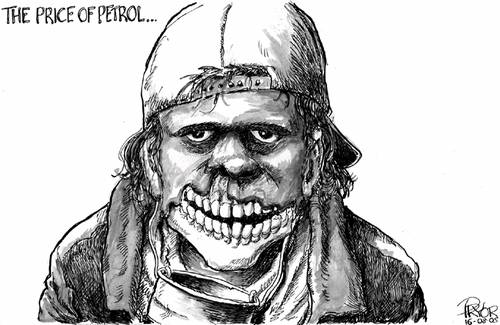|
August 17, 2005
I'm not sure about this cartoon. What does it mean? It puzzles me. The meaning is not obvious.

Pryor
I'm not sure what it signifies. It is a powerful image though, is it not?
Does it mean that our oil-based civilization will collapse and we return to barbarism because the high cost of petrol will stifle the economy? We go back to the dark ages?
Petrol is rising because demand is fast increasing (India and China) and exceeds the supply. That is what the economists tell us. So we cannot afford to rely on petrol any more.
Honestly, I'm not confident of that interpretation. I do not think that it gets it. I do sense that it is a critique. Anyone got any clues?
|

I think it means the price of petrol is the genocide of our Indigenous people. We keep it cheap for us and dangerous for them. We are all responsible for this.